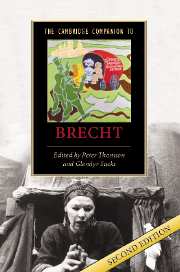Book contents
- Frontmatter
- Part I Context and Life
- Part II The Plays
- Part III Theories and Practices
- 12 Brecht and the Berliner Ensemble - the making of a model
- 13 Revolutionising theatre: Brecht’s reinvention of the dramaturg
- 14 Key words in Brecht’s theory and practice of theatre
- 15 Brecht’s poetry
- 16 Brecht and music: theory and practice
- 17 Brecht and stage design: the Bühnenbildner and the Bühnenbauer
- 18 Actors on Brecht
- 19 Brecht and film
- Bibliography
- Index
- Series List
15 - Brecht’s poetry
from Part III - Theories and Practices
Published online by Cambridge University Press: 28 March 2007
- Frontmatter
- Part I Context and Life
- Part II The Plays
- Part III Theories and Practices
- 12 Brecht and the Berliner Ensemble - the making of a model
- 13 Revolutionising theatre: Brecht’s reinvention of the dramaturg
- 14 Key words in Brecht’s theory and practice of theatre
- 15 Brecht’s poetry
- 16 Brecht and music: theory and practice
- 17 Brecht and stage design: the Bühnenbildner and the Bühnenbauer
- 18 Actors on Brecht
- 19 Brecht and film
- Bibliography
- Index
- Series List
Summary
Introduction
Brecht's poetry is remarkable for two things. In a writer who is best known for his plays and his theatre theory, the sheer volume of his output as a poet is surprising. There are some one thousand pages of poetry in volume iv of the Gesammelte Werke (Collected Works), most of which has been translated in Manheim and Willett's Poems 1913-1956. To this one must add the many poems that have come to light since the publication of the Collected Works in 1967 and have appeared in a supplementary volume and in Gedichte über die Liebe (Poems About Love). Second, though Brecht maintained that his poetry was a second string to his bow, the quality and range of his verse rank him among the handful of great German poets of the twentieth-century. From the beginning, he was an extraordinarily diverse writer, and his poetry reflects this. He began early: if we set aside the juvenilia, Brecht started writing poetry of the highest quality around 1918, when he was only twenty years old. Poetry accompanied all phases of his life and career, right up to his death.
The man who changed people's attitudes to so many aspects of the theatre could have made the same claim about poetry. Though there are clear points of contact between his lyrical work and various movements in twentieth-century German literature such as expressionism and the 'new objectivity' (neue Sachlichkeit) of the 1920s, Brecht's best poetry consistently shows us a personal style and a range of techniques that are original, indeed often unique: so much so that in the history of German poetry he occupies the position of a virtual maverick.
- Type
- Chapter
- Information
- The Cambridge Companion to Brecht , pp. 225 - 241Publisher: Cambridge University PressPrint publication year: 2006

